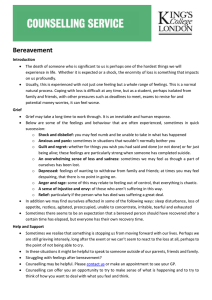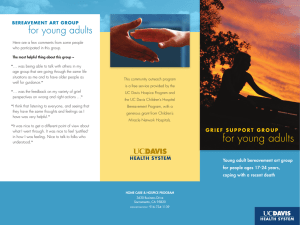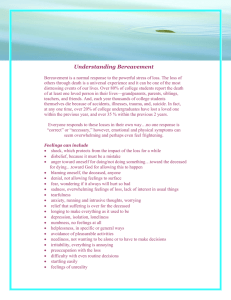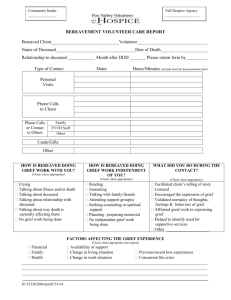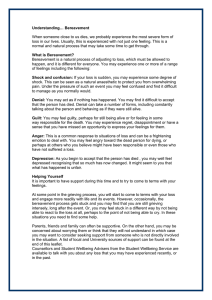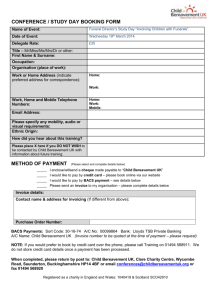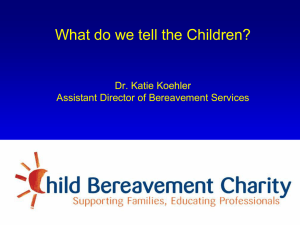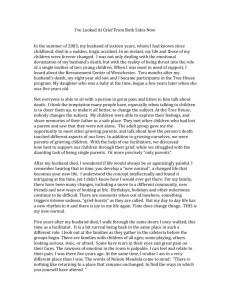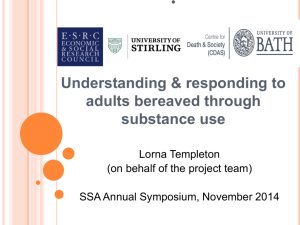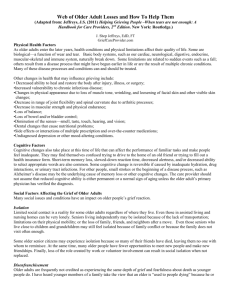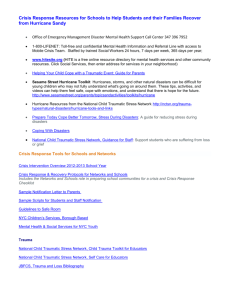When a Child Dies - a loss like no other
advertisement
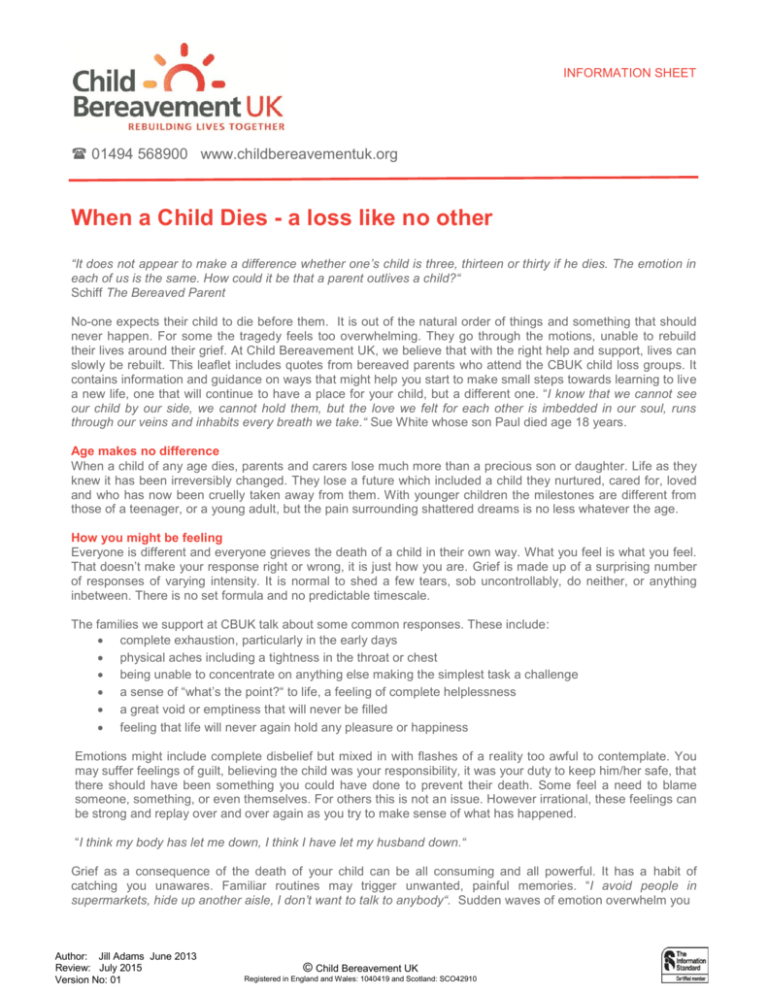
INFORMATION SHEET 01494 568900 www.childbereavementuk.org When a Child Dies - a loss like no other “It does not appear to make a difference whether one’s child is three, thirteen or thirty if he dies. The emotion in each of us is the same. How could it be that a parent outlives a child?“ Schiff The Bereaved Parent No-one expects their child to die before them. It is out of the natural order of things and something that should never happen. For some the tragedy feels too overwhelming. They go through the motions, unable to rebuild their lives around their grief. At Child Bereavement UK, we believe that with the right help and support, lives can slowly be rebuilt. This leaflet includes quotes from bereaved parents who attend the CBUK child loss groups. It contains information and guidance on ways that might help you start to make small steps towards learning to live a new life, one that will continue to have a place for your child, but a different one. “I know that we cannot see our child by our side, we cannot hold them, but the love we felt for each other is imbedded in our soul, runs through our veins and inhabits every breath we take.“ Sue White whose son Paul died age 18 years. Age makes no difference When a child of any age dies, parents and carers lose much more than a precious son or daughter. Life as they knew it has been irreversibly changed. They lose a future which included a child they nurtured, cared for, loved and who has now been cruelly taken away from them. With younger children the milestones are different from those of a teenager, or a young adult, but the pain surrounding shattered dreams is no less whatever the age. How you might be feeling Everyone is different and everyone grieves the death of a child in their own way. What you feel is what you feel. That doesn’t make your response right or wrong, it is just how you are. Grief is made up of a surprising number of responses of varying intensity. It is normal to shed a few tears, sob uncontrollably, do neither, or anything inbetween. There is no set formula and no predictable timescale. The families we support at CBUK talk about some common responses. These include: complete exhaustion, particularly in the early days physical aches including a tightness in the throat or chest being unable to concentrate on anything else making the simplest task a challenge a sense of “what’s the point?“ to life, a feeling of complete helplessness a great void or emptiness that will never be filled feeling that life will never again hold any pleasure or happiness Emotions might include complete disbelief but mixed in with flashes of a reality too awful to contemplate. You may suffer feelings of guilt, believing the child was your responsibility, it was your duty to keep him/her safe, that there should have been something you could have done to prevent their death. Some feel a need to blame someone, something, or even themselves. For others this is not an issue. However irrational, these feelings can be strong and replay over and over again as you try to make sense of what has happened. “I think my body has let me down, I think I have let my husband down.“ Grief as a consequence of the death of your child can be all consuming and all powerful. It has a habit of catching you unawares. Familiar routines may trigger unwanted, painful memories. “I avoid people in supermarkets, hide up another aisle, I don’t want to talk to anybody“. Sudden waves of emotion overwhelm you Author: Jill Adams June 2013 Review: July 2015 Version No: 01 © Child Bereavement UK Registered in England and Wales: 1040419 and Scotland: SCO42910 when you are desparately trying to keep them under control. This is usual. It might help to protect yourself a little by doing things such as the shopping in a different supermarket until you feel a bit stronger and a bit more in control. Gradually the grief softens, you become aware that the good days are increasing in number. Eventually it becomes a part of your life, a part of who you are, and a part of your relationship with your child. Some describe it as a new way of being. Grief and relationships Parents may change so much after the death of their child that to each other they become unrecognisable as the people who met and began a family life years before.They will need to discover who they are all over again and both partners will need space and time as they grieve for their child in their own way and on different timescales. “My partner cannot talk about our child or look at photos, I want to and need to“. Marriages and partnerships may shake or crumble under the heavy weight of grief and loss but in time many will find a path forward. They can become stronger and life will mean something again. Others will be different. Some adults find the death of a child too painful to contemplate and cope by “switching off“. It can be hard if your partner appears unaffected or is behaving in what might come across as an insensitive or inappropriate way. It might help to remember they are still grieving, just doing it differently. See the CBUK information sheet Women, Men and Grief for more on this subject. Other people The families we support tell us that only other parents who have experienced the death of their child can truly appreciate the depth of pain and distress. They explain that this is why they feel so isolated. The bereaved parents we see do find comfort from support and concern offered by family and friends but what is lacking is a real and deep understanding of what it is like to lose a child and how life changes as a result. “People think I am OK because I am dressed and out, they don’t know how I feel inside“. Some people will struggle with what to say to you and therefore say nothing. Others will unintentionally say something hurtful or insenstive. It takes energy you might not have, but people will follow your lead. If you start to talk about your child, probably they will too, but sometimes it is a conversation stopper which you feel obliged to manage. Others may have expectations of how they think you should be feeling and what you should be doing. Try to remind yourself that this is your grief, for your child,and you know better than anyone what is going to get you through. What might help The families we support at CBUK, say don’t expect anything of yourself and take each day as it comes. There is no time scale, and it will probably take longer than you would want before you start to get some sense of life being back on track. Many of our families have found the support of people who are prepared to listen to them going over the death time and time again is key. Some will find these people amongst their own families and friends, others will prefer to seek help from professionals, many use both. Try to be open minded to the various types of support on offer. Counselling offers time with someone whose job it is to listen and who has the training and experience to understand. You can say exactly what you think or feel and know that you are not upsetting them in the same way as family and friends. Couples we support tell us that counselling provides the only time in which they feel safe enough to honestly talk to one another about thoughts and feelings. The CBUK Support and Information Line 01494 568900 can help you to find counsellors in your local area. You can share experiences by going to a group to meet other families whose child has died. Child Bereavement UK runs groups in Buckinghamshire, or contact The Compassionate Friends www.tcf.org.uk for groups throughout the UK. "Meeting other parents who are also going through the devastating loss of a child has shown us that some of the difficult emotions that we feel are 'normal' and it has helped enormously to know we are not alone“. For those who find the thought of going to a group off-putting, the Child Bereavement UK online forum www.childbereavement.org.uk/For/Forum is available to share thoughts, stories, or just say in a very honest way Author: Jill Adams June 2013 Review: July 2015 Version No: 01 © Child Bereavement UK Registered in England and Wales: 1040419 and Scotland: SCO42910 how you are feeling. It has the added attraction of being anonymous and is available at all hours of the day and night. “I have been too emotional to speak at any great length to anyone yet, and this forum has helped me through the very darkest days of my life.” It might help to share stories over the telephone with others who have "been there" with the free Child Death Helpline 0800 282986. This is available for anyone affected by the death of a child. It is staffed by volunteers all of whom are bereaved parents. Going back to work This can be a daunting prospect for both a mother or father. The amount of leave people are given, or take, after a bereavement varies enormously. However much time you have had, you will still be grieving for your child and the decision to go back to work can be a difficult one. For others, returning to work is a positive step, providing some routine to the day. Try to meet with your manager to discuss how you would like your return handled and how best to let everyone know what has happened. It might help ease the transition if you arrange to go in for a short time before your actual start day to meet colleagues. This is a way to help overcome the hurdle of seeing everyone on your firstday back, some of whom might be uncomfortable with what to say to you. Your employer only needs to have as much information as you want to give them, but it is important that they are aware. You may be anxious about becoming tearful or emotional. This may well happen but if people know the reason why, it will help them to understand your upset. Be realistic about what you can manage at work and if you can, find quiet moments for a bit of peace, or time to shed a few tears if you need to. Child Bereavement UK has helpful leaflets Guidance for Employees and Guidance for Employers on returning to work after your baby or child has died. RESOURCES Books and Booklets available from the CBUK shop and Amazon Farewell My Child Stories from families with a wide range of experiences from those whose babies have died to those who have lost adult children £9.00 Guidance for Employees and Guidance for Employers on returning to work after the death of your baby or child. Free to download. Organisations Child Bereavement UK Forum www.childbereavement.org.uk A chance to share experiences online with other bereaved parents The Compassionate Friends www.tcf.org.uk TCF is dedicated to the support and care of other bereaved parents, siblings, and grandparents who have suffered the death of a child/children. The Child Death Helpline www.childdeathhelpline.org.uk is a helpline for anyone affected by the death of a child of any age, from prebirth to adult, under any circumstances, however recently or long ago. Author: Jill Adams June 2013 Review: July 2015 Version No: 01 © Child Bereavement UK Registered in England and Wales: 1040419 and Scotland: SCO42910
